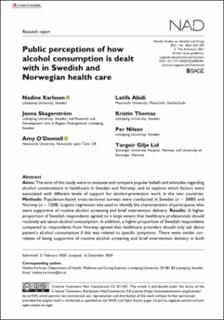| dc.contributor.author | Karlsson, Nadine | |
| dc.contributor.author | Skagerström, Janna | |
| dc.contributor.author | O'Donnell, Amy | |
| dc.contributor.author | Abidi, Latifa | |
| dc.contributor.author | Thomas, Kristin | |
| dc.contributor.author | Nilsen, Per | |
| dc.contributor.author | Lid, Torgeir Gilje | |
| dc.coverage.spatial | Norway and Sweden | en_US |
| dc.date.accessioned | 2021-10-08T08:45:56Z | |
| dc.date.available | 2021-10-08T08:45:56Z | |
| dc.date.created | 2021-10-01T14:11:57Z | |
| dc.date.issued | 2021-03 | |
| dc.identifier.citation | Karlsson, N., Skagerström, J., O'Donnel, A. et al. (2021) Public perceptions of how alcohol is dealt with in Swedish and Norwegian health care. Nordic Studies on Alcohol and Drugs, 38 (3), 243-255. | en_US |
| dc.identifier.issn | 1455-0725 | |
| dc.identifier.uri | https://hdl.handle.net/11250/2788633 | |
| dc.description.abstract | Aims:
The aims of this study were to evaluate and compare popular beliefs and attitudes regarding alcohol conversations in healthcare in Sweden and Norway; and to explore which factors were associated with different levels of support for alcohol-prevention work in the two countries.
Methods:
Population-based cross-sectional surveys were conducted in Sweden (n = 3000) and Norway (n = 1208). Logistic regression was used to identify the characteristics of participants who were supportive of routine alcohol screening and brief intervention delivery.
Results:
A higher proportion of Swedish respondents agreed to a large extent that healthcare professionals should routinely ask about alcohol consumption. In addition, a higher proportion of Swedish respondents compared to respondents from Norway agreed that healthcare providers should only ask about patient’s alcohol consumption if this was related to specific symptoms. There were similar correlates of being supportive of routine alcohol screening and brief intervention delivery in both countries. Support was lower in both countries amongst moderate and risky drinkers, and among single adults or those on parental leave, but higher amongst older individuals. Having had an alcohol conversation in healthcare increased the level of support for alcohol prevention in routine healthcare among risky drinkers.
Conclusions:
There is a high level of support for preventative alcohol conversations in routine healthcare in Norway and Sweden, although there was a lower proportion of respondents who were positive to alcohol prevention in routine healthcare in Norway compared to Sweden. Experiencing alcohol conversation may positively affect risky drinkers’ attitudes towards and support for alcohol prevention. Thus, more frequent alcohol conversations in routine healthcare may also result in increased level of support for alcohol prevention among risky drinkers. | en_US |
| dc.language.iso | eng | en_US |
| dc.publisher | SAGE Publishing | en_US |
| dc.rights | Navngivelse-Ikkekommersiell 4.0 Internasjonal | * |
| dc.rights.uri | http://creativecommons.org/licenses/by-nc/4.0/deed.no | * |
| dc.subject | alkohol | en_US |
| dc.title | Public perceptions of how alcohol is dealt with in Swedish and Norwegian health care | en_US |
| dc.type | Peer reviewed | en_US |
| dc.type | Journal article | en_US |
| dc.description.version | publishedVersion | en_US |
| dc.rights.holder | (c) The Author(s) 2021 | en_US |
| dc.subject.nsi | VDP::Medisinske Fag: 700::Helsefag: 800 | en_US |
| dc.source.pagenumber | 243-255 | en_US |
| dc.source.volume | 38 | en_US |
| dc.source.journal | Nordic Studies on Alcohol and Drugs | en_US |
| dc.source.issue | 3 | en_US |
| dc.identifier.doi | 10.1177/1455072520985981 | |
| dc.identifier.cristin | 1942268 | |
| cristin.ispublished | true | |
| cristin.fulltext | original | |
| cristin.qualitycode | 1 | |

